Induction of TGF-beta 1, not regulatory T cells, impairs antiviral immunity in the lung following bone marrow transplant
- PMID: 20348421
- PMCID: PMC3314499
- DOI: 10.4049/jimmunol.0901871
Induction of TGF-beta 1, not regulatory T cells, impairs antiviral immunity in the lung following bone marrow transplant
Abstract
Patients receiving hematopoietic stem cell transplantation or bone marrow transplantation (BMT) as therapy for various malignancies or autoimmune diseases have an increased risk for infectious complications posttransplant, especially in the lung. We have used BMT in mice and murine gammaherpesvirus, gammaHV-68, to study the efficacy of adaptive immune responses post-BMT. Five weeks posttransplant, mice have fully reconstituted their hematopoietic lineages in both the lung and periphery. When challenged with virus, however, BMT mice have a reduced ability to clear lytic virus from the lung. Defective viral control in BMT mice is not related to impaired leukocyte recruitment or defective APC function. Rather, BMT mice are characterized by defective CD4 cell proliferation, skewing of effector CD4 T cells from a Th1 to a Th17 phenotype, and an immunosuppressive lung environment at the time of infection that includes overexpression of TGF-beta1 and PGE(2) and increased numbers of regulatory T cells. Neither indomethacin treatment to block PG synthesis nor anti-CD25 depletion of regulatory T cells improved antiviral host defense post-BMT. Transplanting mice with transgenic bone marrow expressing a dominant-negative TGF-betaRII under the permissive CD4 promoter created mice in which effector CD4 and CD8 cells were unresponsive to TGF-beta1. Mice with TGF-beta1-nonresponsive effector T cells had restored antiviral immunity and improved Th1 responses post-BMT. Thus, our results indicate that overexpression of TGF-beta1 following myeloablative conditioning post-BMT results in impaired effector T cell responses to viral infection.
Conflict of interest statement
The authors have no financial conflicts of interest.
Figures
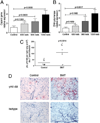
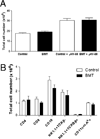


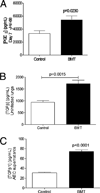

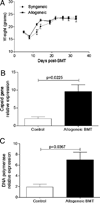

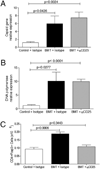
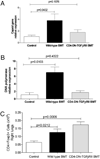
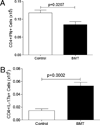
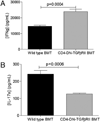
Comment in
-
Comment on "Induction of TGF-beta 1, not regulatory T cells, impairs antiviral immunity in the lung following bone marrow transplant".J Immunol. 2010 Aug 1;185(3):1350-1; author reply 1351. doi: 10.4049/jimmunol.1090060. J Immunol. 2010. PMID: 20660356 No abstract available.
References
-
- Horowitz MM, Loberiza FR, Bredeson CN, Rizzo JD, Nugent ML. Transplant registries: guiding clinical decisions and improving outcomes. Oncology (Williston Park) 2001;15:649–659. discussion 663–644, 666. - PubMed
-
- Copelan EA. Hematopoietic stem-cell transplantation. N. Engl. J. Med. 2006;354:1813–1826. - PubMed
-
- Soubani AO, Miller KB, Hassoun PM. Pulmonary complications of bone marrow transplantation. Chest. 1996;109:1066–1077. - PubMed
-
- Wald A, Leisenring W, van Burik JA, Bowden RA. Epidemiology of Aspergillus infections in a large cohort of patients undergoing bone marrow transplantation. J. Infect. Dis. 1997;175:1459–1466. - PubMed
-
- Lossos IS, Breuer R, Or R, Strauss N, Elishoov H, Naparstek E, Aker M, Nagler A, Moses AE, Shapiro M, et al. Bacterial pneumonia in recipients of bone marrow transplantation: a five-year prospective study. Transplantation. 1995;60:672–678. - PubMed
Publication types
MeSH terms
Substances
Grants and funding
LinkOut - more resources
Full Text Sources
Other Literature Sources
Medical
Research Materials

